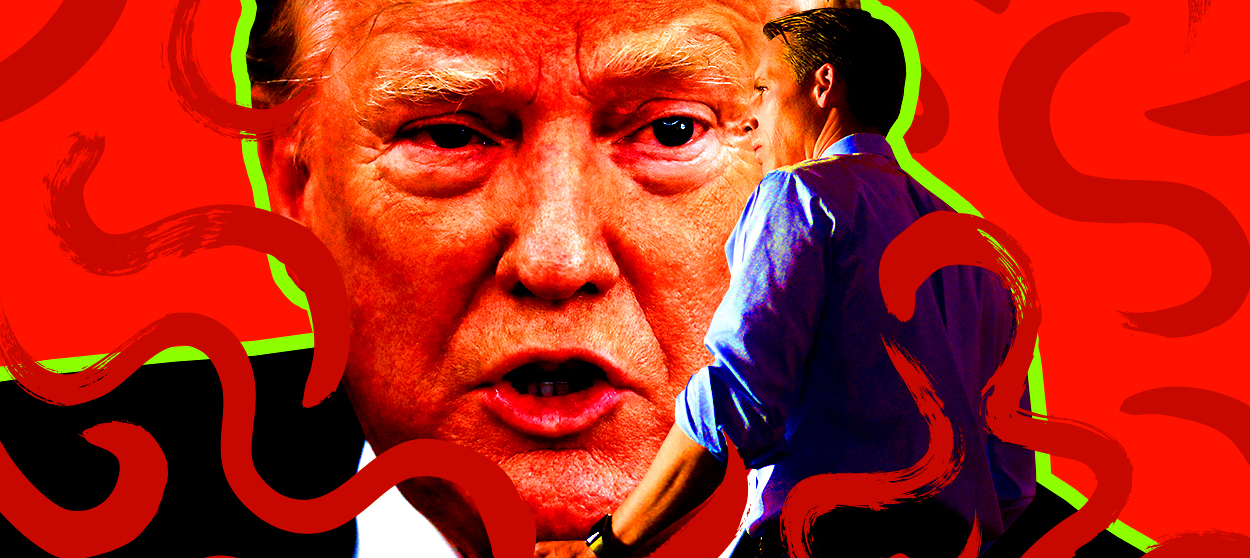The future of Trumpism is more erudite — and just as frightening
Is Josh Hawley putting a scholarly twist on Trump's xenophobia?


A free daily email with the biggest news stories of the day – and the best features from TheWeek.com
You are now subscribed
Your newsletter sign-up was successful
Donald Trump will not be president forever. Even if he doesn't lose the election in 2020 — and few incumbents in American history have ever been as broadly and deeply hated as he is — he will be a lame duck, and he does not cultivate successors. (He doesn't think about the future at all, as far as I can tell). But because his personality and policies tend to suck up all the oxygen in the room — and because his way of provoking crisis after crisis makes long-term thinking impossible — it can be hard to imagine what conservative politics will look like after Donald Trump. Will the GOP go back to its 2012 dreams of political inclusivity? Will it be like the end of Game of Thrones or the Lord of the Rings, where defeating Sauron or the Night King magically causes his works and minions to wither away and disappear?
Probably not! Despite the widespread Democratic fantasy that defeating Trump is all that matters, Trumpism is now, quite firmly, how the GOP thinks and operates: by presiding over the first unified GOP government since 2007, Trump made nativist populism the central, inextricable thrust of his party's political appeal. His policies are hardly sui generis, of course, however much his strain of ostentatious cruelty has been unique to the last three years. But the party's core has changed: the Ronald Reagan who in 1984 declared, that "I believe in the idea of amnesty for those who have put down roots and lived here (even though some time back they may have entered illegally)" is gone, as is the George H.W. Bush who signed Ted Kennedy's 1990 immigration reform bill; the GOP's free market zeal has been replaced by full-throated xenophobic panic. In the 2016 GOP primaries, Marco Rubio and Ted Cruz spoke Spanish — as both of the Bush brothers occasionally did — but those kinds of gestures are gone, unlikely to return. History moves forward: What Trump has done to the GOP — or what he has exemplified in its evolution — will outlive him.
Predicting the future is perilous, but it's always worth keeping an eye on the people who are planning for it. Thirty-nine year old Sen. Josh Hawley's (R-Mo.) keynote speech at the National Conservatism Conference last week provides a window into what Trumpism might look like, after Trump, and how it might think.
The Week
Escape your echo chamber. Get the facts behind the news, plus analysis from multiple perspectives.

Sign up for The Week's Free Newsletters
From our morning news briefing to a weekly Good News Newsletter, get the best of The Week delivered directly to your inbox.
From our morning news briefing to a weekly Good News Newsletter, get the best of The Week delivered directly to your inbox.
Like the rest of the conference — "an attempt to superimpose an intellectual framework onto the brute force of Trumpism," as Emma Green described it — Hawley worked hard not to talk about Trump himself, mentioning his name only to insist on transcending his divisiveness. Yet by making an argument for a culturally-conservative economic nationalism, his speech rhymes with the "America First" heterodoxy of Trump's tariffs with China and attacks on NAFTA. And as Hawley condemned the "cosmopolitan consensus" on hyper-globalization — which he characterized as insisting on "more movement of capital, more trade on whatever terms," and working to bring about a global integration so that "the boundaries between America and the rest of the world should fade and eventually vanish" — he made an intellectual argument for Trump's border aggression that Trump, himself, could never make.
After all, Trump's speeches are always, ultimately, about himself, the only character in the play that interests him; his self-centered accounts of the great deals he's getting for this country — which no previous president was ever shrewd enough to secure — always boil down to more evidence of his personal acumen. But for all his cruelty as a person, ego animates him more than any principled xenophobia. His nativism is lazy and reflexive, a function of his ability to read a room (and to enjoy Fox News). White supremacy is as white supremacy does — and Donald Trump certainly has done some white supremacy — but he's ultimately not interested enough in anyone but himself to be the kind of fascist his fascist fans would like him to be. Immigrants are a problem to be solved, for Trump, so that everyone can praise Trump for solving the problem.
No one would mistake Hawley's erudite nationalism for Trump's. He writes like the Stanford and Yale-educated former Supreme Court clerk that he is — filling his speech with carefully-considered turns of phrase and almost completely omitting himself from it — but he also has something Trump doesn't: a coherent account of the enemies at the heart of our divided nation. Trump's objections to immigrants are largely fictional — the slander that immigrants are criminals, for example — but Hawley's argument is that mixed loyalties are, as such, the problem: America's enemies are the cosmopolitans who, quite literally, do not put America first.
"This class lives in the United States, but they identify as 'citizens of the world,'" he declared last week:
A free daily email with the biggest news stories of the day – and the best features from TheWeek.com
They run businesses or oversee universities here, but their primary loyalty is to the global community. And they subscribe to a set of values held by similar elites in other places: things like the importance of global integration and the danger of national loyalties; the priority of social change over tradition, career over community, and achievement and merit and progress. [Sen. Hawley]
Alongside coded appeals to conservative Christians and the usual red-meat conservative attacks on universities — as well as the omnipresent "elites" for whom the blue-state adjective "coastal" barely needs to be spoken out loud — Hawley clearly grasps what mainstream Democrats and Republicans often prefer not to notice: that Trump's rise to the top of the GOP heap in 2016 greatly benefitted from a rhetorical disaffection with free market absolutism. And so, when Hawley declares that "an economy driven by money-changing on Wall Street ultimately benefits those who had the money to begin with," the biblical reference is how you know it's a Republican senator speaking, rather than Elizabeth Warren or Bernie Sanders. But the appeal to economic nationalism — and his attack on financial elites — allows him to connect the dots between capitalist dysfunction and border security, twisting anger at the former into an argument for the latter.
You might not think, after all, that an attack on elites could serve as code for immigration policies that target impoverished migrants. He only uses the word "immigration" twice, first to blame it on globalization and second to call for "an immigration system that rewards and nourishes American labor rather than devaluing it." But if his concern were the value of labor, you'd think he'd jump at raising the minimum wage or support worker unionization; the fact that he hasn't (and hasn't) is anything but surprising for a Koch-funded GOP senator and underscores how "cheap overseas labor" serves as a scapegoat to shield the employers that want to pay them so little.
But just because he doesn't talk about Trump doesn't mean his speech isn't all about Trumpism, and his coyness about immigration shouldn't fool anyone either. If anything, it understates the speech's perniciousness to observe that "cosmopolitan" has long been an anti-semitic code word; the entire argument of the speech is that America does have enemies, and they're the hidden non-Americans among us.
It can sometimes feel like Trump blundered into becoming the avatar of a modern resurgence of nationalist xenophobia, whose principles he only imperfectly adheres to; like Evangelical Christians — who accept his personal conduct because he appoints "godly" judges — the far right has long viewed Trump as a means to an end. But if Trump came to xenophobia late in life, Hawley has studied his way there. He is the author of a biography of Theodore Roosevelt, and Roosevelt clearly provides his political model: a conservative Republican who busted trusts, ran for president as a Progressive, and was friends and intellectual fellow travelers with some of this country's most virulent eugenicists and anti-immigrant racists. But Roosevelt's racism wasn’t simply in his essays and letters and speeches (and friendships); as president, his "Gentlemen's Agreement" with Japan and 1907 Immigration Act were premised on the notion that non-white immigrants were less desirable — even actively harmful — for the country than western Europeans.
The cosmopolitans Hawley attacks sound a lot like what Roosevelt called "an invisible government owing no allegiance and acknowledging no responsibility to the people," and while phrases like "the unholy alliance between corrupt business and corrupt politics" might sound archaic, there is little daylight between the underlying sentiment — and conspiratorial overtones — of Roosevelt's positions and Hawley's. In both cases, xenophobic nationalism connects the dots: "Cosmopolitan" financiers and corrupt politicians are the villains and their common weapon is an immigrant labor force that they use to "devalue" American workers. And like Roosevelt — who worried constantly about white American breeding — Hawley's concern that "marriage rates among working class Americans are falling" and "birth rates are falling" transforms economic struggle into cultural peril. If he doesn't express it in exactly fourteen words, the sentiment is the same.
It might seem optimistic to say that Donald Trump's moment is passing. It isn't. No one saw Trump's victory coming, and for good reasons: His campaign was a perfect storm of unique and unrepeatable circumstances, and it remains one of the oddest things to have ever happened in American politics. But the reality of his presidency has had its effect, and that effect will outlive him. No one grasps that more clearly than the youngest Republican in the Senate.
Aaron Bady is a founding editor at Popula. He was an editor at The New Inquiry and his writing has appeared in The New Yorker, The New Republic, The Nation, Pacific Standard, The Los Angeles Review of Books, and elsewhere. He lives in Oakland, California.
-
 The ‘ravenous’ demand for Cornish minerals
The ‘ravenous’ demand for Cornish mineralsUnder the Radar Growing need for critical minerals to power tech has intensified ‘appetite’ for lithium, which could be a ‘huge boon’ for local economy
-
 Why are election experts taking Trump’s midterm threats seriously?
Why are election experts taking Trump’s midterm threats seriously?IN THE SPOTLIGHT As the president muses about polling place deployments and a centralized electoral system aimed at one-party control, lawmakers are taking this administration at its word
-
 ‘Restaurateurs have become millionaires’
‘Restaurateurs have become millionaires’Instant Opinion Opinion, comment and editorials of the day
-
 The billionaires’ wealth tax: a catastrophe for California?
The billionaires’ wealth tax: a catastrophe for California?Talking Point Peter Thiel and Larry Page preparing to change state residency
-
 Bari Weiss’ ‘60 Minutes’ scandal is about more than one report
Bari Weiss’ ‘60 Minutes’ scandal is about more than one reportIN THE SPOTLIGHT By blocking an approved segment on a controversial prison holding US deportees in El Salvador, the editor-in-chief of CBS News has become the main story
-
 Has Zohran Mamdani shown the Democrats how to win again?
Has Zohran Mamdani shown the Democrats how to win again?Today’s Big Question New York City mayoral election touted as victory for left-wing populists but moderate centrist wins elsewhere present more complex path for Democratic Party
-
 Millions turn out for anti-Trump ‘No Kings’ rallies
Millions turn out for anti-Trump ‘No Kings’ ralliesSpeed Read An estimated 7 million people participated, 2 million more than at the first ‘No Kings’ protest in June
-
 Ghislaine Maxwell: angling for a Trump pardon
Ghislaine Maxwell: angling for a Trump pardonTalking Point Convicted sex trafficker's testimony could shed new light on president's links to Jeffrey Epstein
-
 The last words and final moments of 40 presidents
The last words and final moments of 40 presidentsThe Explainer Some are eloquent quotes worthy of the holders of the highest office in the nation, and others... aren't
-
 The JFK files: the truth at last?
The JFK files: the truth at last?In The Spotlight More than 64,000 previously classified documents relating the 1963 assassination of John F. Kennedy have been released by the Trump administration
-
 'Seriously, not literally': how should the world take Donald Trump?
'Seriously, not literally': how should the world take Donald Trump?Today's big question White House rhetoric and reality look likely to become increasingly blurred
